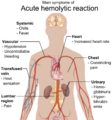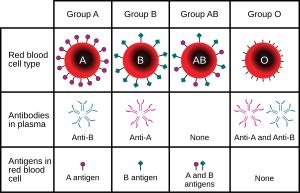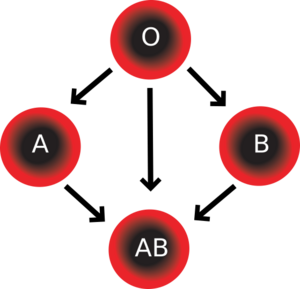Blood type facts for kids
Your blood type (or blood group) is like a special tag on your blood. It tells us what kind of blood you have. It's a way to sort blood based on tiny markers called antigens found on the surface of your red blood cells.
Knowing your blood type is super important, especially if you ever need a blood transfusion. If someone gets the wrong blood type, their body might have a serious reaction, which can be very dangerous. That's why doctors always check blood types carefully before a transfusion or an organ transplant. They need to make sure the blood from the donor (the person giving blood) matches the receiver (the person getting blood).
There are many ways to classify blood, but the two most important systems are the ABO blood group system and the Rhesus blood group system. These systems look for specific antigens like A, B, and RhD on your red blood cells.
ABO System
How it Works
The ABO system is based on different types of sugars found on the surface of your red blood cells. A scientist named Karl Landsteiner first discovered this.
Your body is used to its own blood type. If it sees a blood type it doesn't recognize, it will create special defenders called antibodies. These antibodies act like tiny soldiers that attack anything foreign. So, if you have type A blood, your body will make antibodies against type B blood. If you have type B blood, you'll make antibodies against type A.
If these antibodies meet the wrong type of blood during a transfusion, they can cause the red blood cells to clump together. This can be very harmful and even deadly. People with type O blood don't have A or B antigens, so their blood can often be given to people with A or B blood types without causing a reaction.
Babies don't have these anti-A and anti-B antibodies when they are born. They usually develop them during their first few years of life. These antibodies are also too big to pass from a mother to her foetal blood during pregnancy.
The Test
Doctors test your blood in a laboratory to find out which antigens you have. Based on the antigens, they can tell your blood type and which antibodies your body naturally makes:
- Group A (has the A-antigen) has anti-B antibodies.
- Group B (has the B-antigen) has anti-A antibodies.
- Group AB (has both A and B-antigens) has no antibodies.
- Group O (has no antigens) has anti-A and anti-B antibodies.
Your blood type is usually described with a letter (A, B, AB, or O) and then a "positive" or "negative" sign. For example, "A positive" (A+) or "O negative" (O-). The "positive" or "negative" part refers to the Rhesus factor, which we'll talk about next.
Compatibility
It's very important to match blood types for transfusions. Here's a simple guide:
- Group O blood has no antigens, but it has both anti-A and anti-B antibodies. This means people with Group O blood can only receive blood from other Group O people. However, because their blood has no A or B antigens, they can give blood to any ABO group.
- Group A blood has anti-B antibodies. So, people with Group A blood can receive blood from Group A or Group O people. They can donate blood to people with Group A or Group AB blood.
- Group B blood has anti-A antibodies. This means people with Group B blood can receive blood from Group B or Group O people. They can donate to Group B or Group AB.
- Group AB blood has no antibodies. This is great because people with Group AB blood can receive blood from any blood group! However, they can only donate blood to other people with Group AB blood.
People with O negative blood are often called universal donors. This is because their blood can be given to almost anyone in an emergency. People with AB positive blood are called universal recipients because they can receive blood from any other blood group.
Rhesus Factor
The Rh factor (short for Rhesus) is another important marker on your red blood cells. It's named after the Rhesus monkey, where it was first found. The Rh factor is a protein that you either have or you don't.
- If you have the Rh factor, you are Rh positive (like A+ or O+).
- If you don't have the Rh factor, you are Rh negative (like A- or O-).
Just like with the ABO system, it's crucial that the Rh factor matches between the blood donor and the person receiving the blood. Before any transfusion, doctors do many tests to make sure everything is safe and that there won't be any problems for the receiver.
Images for kids
See also
 In Spanish: Grupo sanguíneo para niños
In Spanish: Grupo sanguíneo para niños





